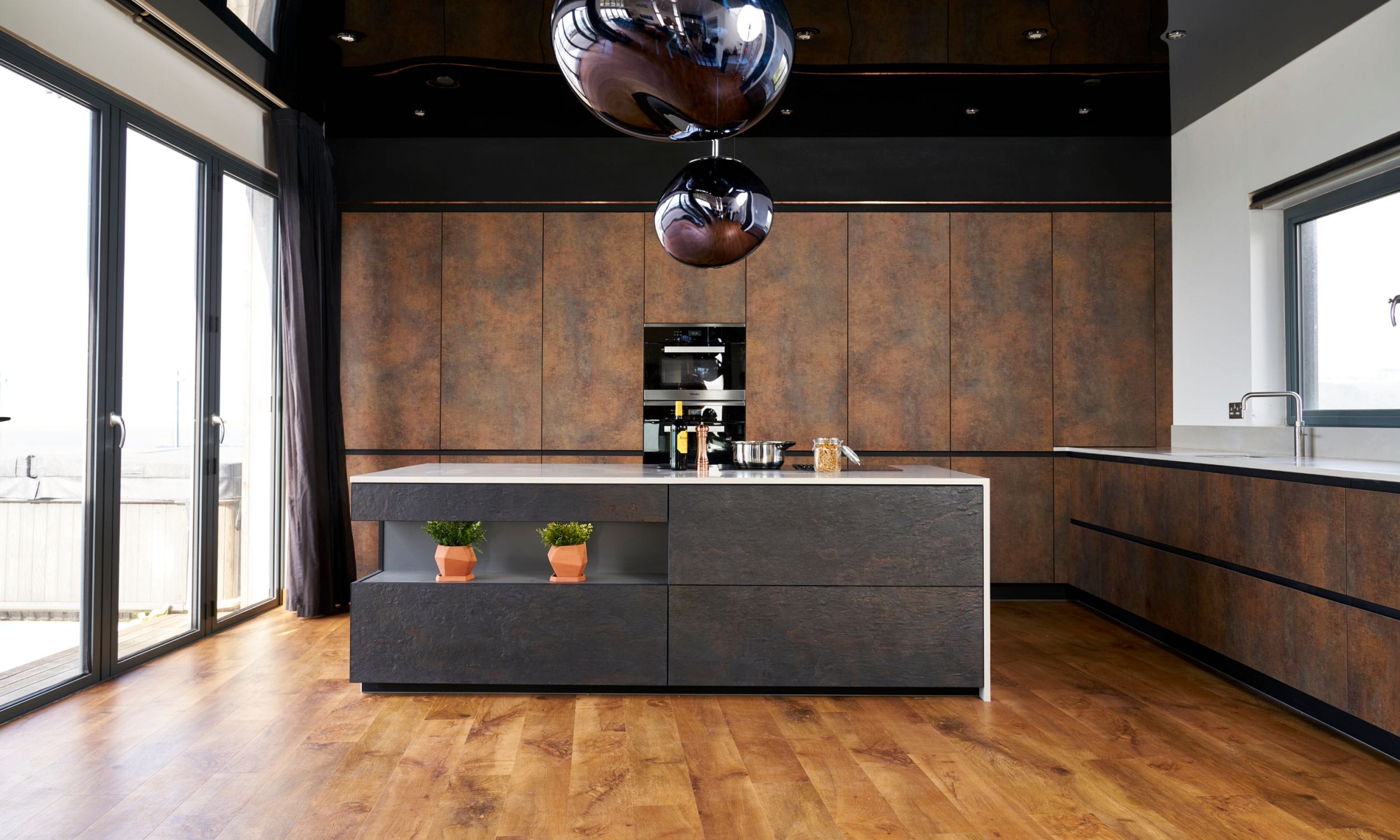
For homeowners embarking on a luxury kitchen renovation, one of the most important decisions is what type of flooring to install.
While some may prefer tiles, LVTs (luxury vinyl tiles) or even engineered wood, sometimes going back to basics can be worthwhile both short- and long-term. Wooden floors undoubtedly add warmth and character to a space and can provide some much-needed character and charm to an existing kitchen space.
However, many question whether wood is durable and practical enough for the demands of a kitchen.
Is Wood Flooring a Wise Choice for Luxury Kitchen Designs?
As experts in crafting breathtaking bespoke kitchens, we at the Brighton Kitchen Company understand this common flooring question. Today, we’ll uncover whether wood floors stand up to the rigours of a well-loved kitchen that you, as a homeowner, plan to use and spend time in every day.
Your kitchen needs to be expertly designed to suit your lifestyle, and that means that kitchen flooring has to be chosen carefully; overlooking it can leave homeowners feeling frustrated and dissatisfied, which we, as kitchen design experts in Sussex, do not want.
From moisture to spills, appliances, and high traffic, we reveal what you must consider before installing wood flooring in your new luxury handleless, shaker or contemporary kitchen design.

The Perks of Wood Kitchen Floors
Let’s start with why wood remains a popular flooring choice for kitchen makeovers.
Few materials rival the sheer beauty of natural wood. Solid hardwood planks exhibit unparalleled warmth and bring a cosy, homey character to a space. Wood effortlessly pairs with any kitchen style, from modern and minimalist to ornate and traditional. Its natural patina and variation lend depth and dimension difficult to recreate with other monotonous materials.
While wood requires some upkeep, it’s often simpler to clean than grouted tile or textured stone floors. Spills can be quickly wiped up without staining or discolouration. Provided any excessive moisture is swiftly addressed, wood won’t harbour odours or bacteria like other porous surfaces.
For those opting for a smooth, seamless appearance, ceramics, and porcelain mimic wood beautifully. However, prolonged periods of standing cooking on these hard surfaces can be punishing. Wood has a subtle “give” for comfort underfoot, especially desirable in a luxury kitchen that will be used for entertaining and hosting regularly.
Using reclaimed or engineered sustainable wood floors check the boxes for eco-conscious homeowners. Compared to newly manufactured alternatives, reclaimed wood reduces environmental impact by reusing lumber.
While wood will show wear and tear after continued, heavy use, quality hardwoods can be refinished instead of fully replaced. Sanding and refinishing restore wooden panels to like-new condition. This makes wood a sound long-term investment over the lifetime of your luxury bespoke kitchen.

What to Consider Before Installing Wood Flooring
It’s clear to see that wood delivers style and substance when thoughtfully incorporated into kitchen design. However, it does demand some special considerations before installation.
A kitchen generates copious amounts of moisture daily, from boiling and steaming to washing dishes and using appliances that generate heat. Excess humidity causes wood planks to expand and contract, eventually warping and distorting the floor.
Therefore, the choice of wood matters hugely. Denser “closed grain” oak, for example, withstands humidity better than softer woods. Still, a humidity-resistant finish is highly recommended before planks are laid down.
By the same token, where moisture goes, heat follows. From hot pans straight from the hob to kettles boiled for tea, kitchen floors can see extreme temperature shifts, particularly when the weather is inclement. That said, placing area rugs around appliances buffers wood from direct high-heat contact. Although these rugs will garner scents from continued exposure to cooking areas, therefore they must be washed and treated regularly.
Kitchens are prone to spills. Oil, vinegar, wine, sauce, and condiment spills will occur at some point; it’s inevitable. While some spillage is normal, excessive liquid can severely damage the wood when not promptly or meticulously cleaned. Hastily wiping them can leave a residue which can congeal and cause rot if left unattended.
The solution? Opt for engineered wood or a highly water-resistant wood species like teak. Promptly wiping off any spills and avoiding letting wet dishes/glasses sit on the floor minimises issues. Protective mats around heavy-use zones wouldn’t hurt either.

Is Wood Flooring Right for Your Kitchen?
When thoughtfully selected and properly cared for, wood floors bring timeless beauty to luxury kitchen spaces. However, the demands of this high-traffic, high-moisture environment mean wood flooring isn’t suitable for every home.
If your family lifestyle demands ultra-resilient, waterproof flooring, alternative materials like vinyl plank, ceramic tile or natural stone may better fit the bill. Or for the look of wood without the fuss, LVTs realistically mimic gorgeous natural grain patterns with half the maintenance.
However, for design-conscious homeowners willing to invest in quality kitchen installations and provide basic care, wood unleashes breathtaking potential. Play to wood’s strengths by combining it with moisture-friendly finishes and smart kitchen design choices.
Let’s Bring Your Dream Wood Floor Kitchen to Life
Ready to explore wood flooring further for your bespoke kitchen design? The Brighton Kitchen Company offers complimentary design consultations, allowing you to fully discuss options with our award-winning designers.
Book your consultation today and discover what bespoke kitchen magic we can design for you.
